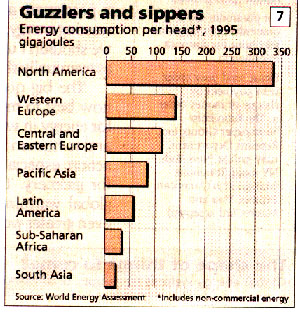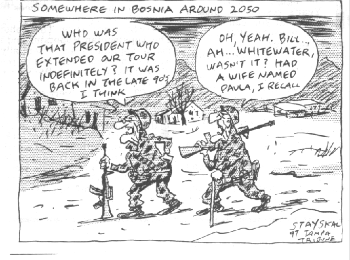|
Long before Vietnam, Americans were worried with the "military-industrial
complex". A correct, though Marxist, idea that the WW I was
partially caused by a conspiracy among greedy capitalists,
weapons manufacturers - "merchants of death", lead to full-blown
Senate hearings: the Nye probe - where likes of J.P.Morgan and
Du Pont brothers were called to testify. The Nye probe lead to
passage of Neutrality Acts, that made it illegal to lend money or
export arms to belligerents - which included victims of aggression,
like the Spanish Republic.
|
American people don't like going to war. But they love their presidents, when they go to war. The only three times, in sixty years of Gallup polling, when the popular approval of the U.S. president's job performace was above 80%, were:
- Pearl Harbour, 1941, Roosevelt
- Bay of Pigs, 1961, Kennedy
- Gulf War, 1991, Bush
|
|
 The reason why the U.S. needed to fight the Gulf War in 1991 and why it cannot sign the Kyoto Agreement ten years later is in the precarious "American way of life" - an average American consumes more than twice gigajoules of energy than an average Western-European, and about seven times as much as an average Sub-Saharan African. In the country built around the car paradigm, eight-lane highways are not wide enough, SUV-s are not big enough, and there is never enough fuel.
The reason why the U.S. needed to fight the Gulf War in 1991 and why it cannot sign the Kyoto Agreement ten years later is in the precarious "American way of life" - an average American consumes more than twice gigajoules of energy than an average Western-European, and about seven times as much as an average Sub-Saharan African. In the country built around the car paradigm, eight-lane highways are not wide enough, SUV-s are not big enough, and there is never enough fuel.
 At the beginning of the century president W.H.Taft aimed to
prevent wars through arbitration of international disputes, yet
then Senate Foreign Relations Committee chairman H.C.Lodge
(who disliked even the notion of creating a body that "might
consist of foreigners". e.g. like the U.N. today) managed to amend
the arbitration pacts, that Taft signed, to death before passage.
Between the world wars in Paris 62 countries agreed to "renounce
war" and settle disputes by "pacific means", adopting the Kellog-Briand Pact outlawing war, drafted by no less a peacenik than a
U.S. Secretary of State Frank B. Kellogg. The Senate immediately
added reservations to U.S. ratification: no one had to act in case
of a treaty violation - making the treaty worthless.
At the beginning of the century president W.H.Taft aimed to
prevent wars through arbitration of international disputes, yet
then Senate Foreign Relations Committee chairman H.C.Lodge
(who disliked even the notion of creating a body that "might
consist of foreigners". e.g. like the U.N. today) managed to amend
the arbitration pacts, that Taft signed, to death before passage.
Between the world wars in Paris 62 countries agreed to "renounce
war" and settle disputes by "pacific means", adopting the Kellog-Briand Pact outlawing war, drafted by no less a peacenik than a
U.S. Secretary of State Frank B. Kellogg. The Senate immediately
added reservations to U.S. ratification: no one had to act in case
of a treaty violation - making the treaty worthless.